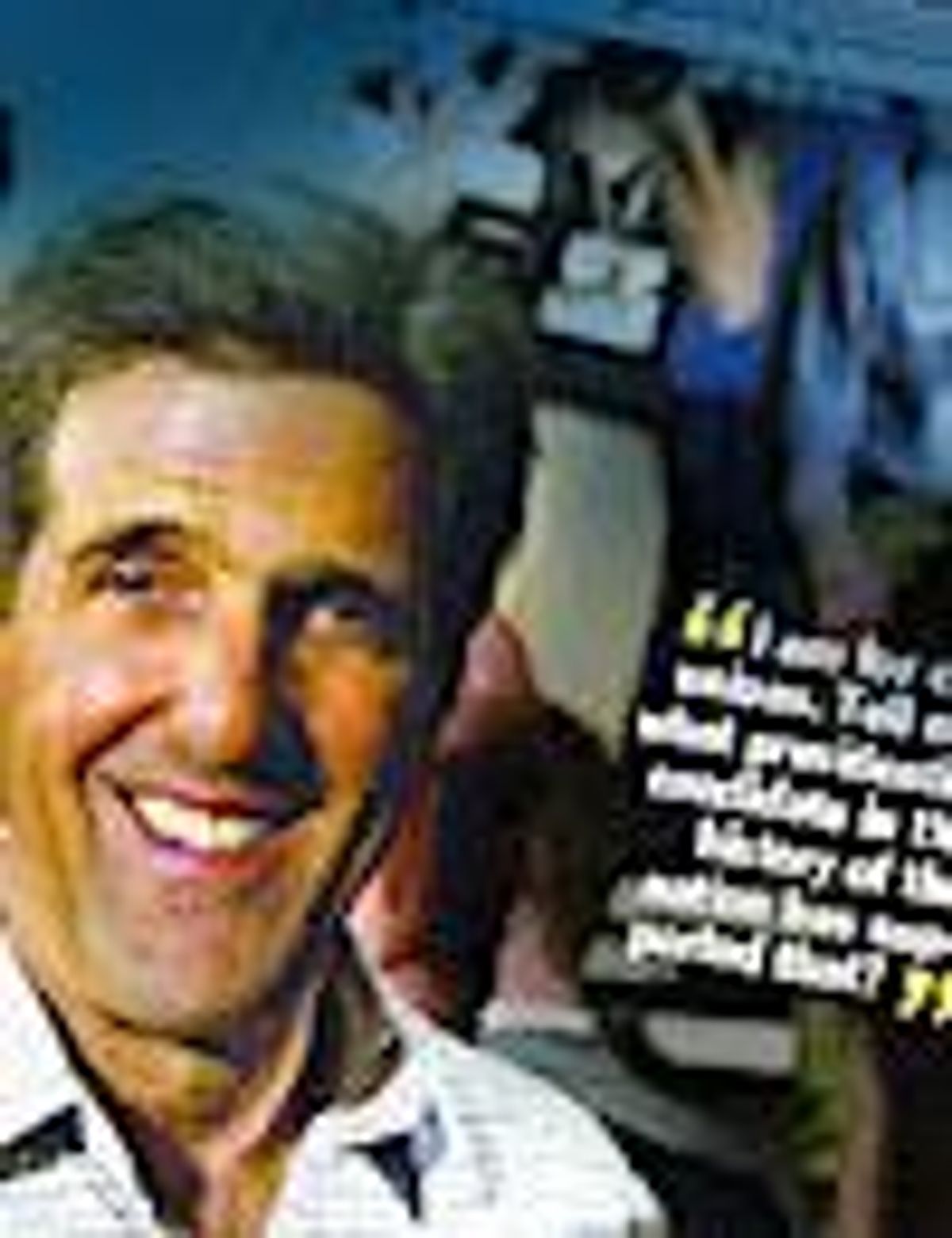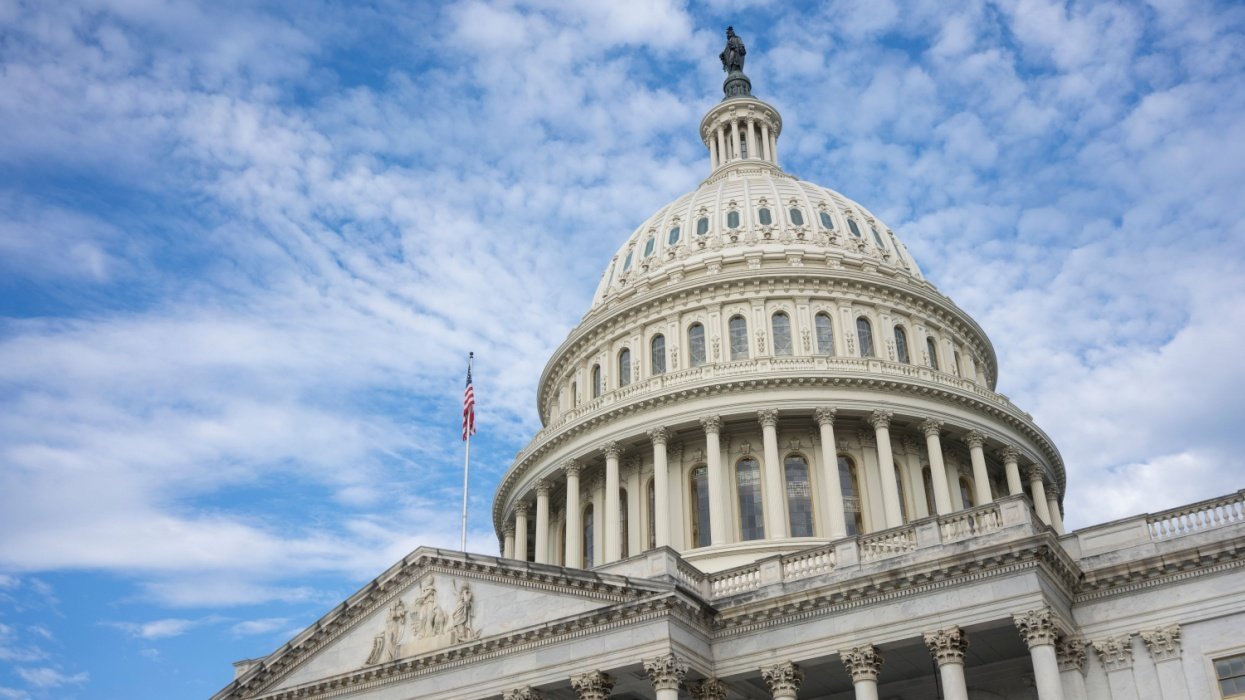Down a hallway
guarded by a handful of Secret Service agents, Democratic
presidential candidate John Kerry sits in a small conference
room at a long table shuffling through paperwork. He
has just finished rallying a room full of senior
citizens in Des Moines, some of whom tell him their
bank accounts are stretched so thin that they must choose
between buying groceries or prescription drugs. Now
the junior senator from Massachusetts sits across from
the news features editor of The Advocate for an
exclusive interview. He is well-versed in handling
questions about gay Americans and the simple rights
they desperately want but have been denied.
"I have a 35-year lifetime record of
fighting for equality," says Kerry, who is
endorsed by such national gay advocacy groups as the
Human Rights Campaign. "The difference between me and
George Bush will be the difference to gay and lesbian
couples and individuals across this
country--whether rights are afforded them or whether
or not they are discriminated against."
Since 1992, every Democratic nominee for
president has given The Advocate an interview, but
Kerry is the only one with the mettle to do it this
close to an election. Bill Clinton and Al Gore spoke
with the magazine months before facing voters on Election
Day. Kerry speaks to us in an issue that will reach readers
mere days before November 2.
Once again, Kerry will go on the record in
support of gay equality. He doesn't have to do
this. Frankly, a sizable number of gay, lesbian,
bisexual, and transgendered Americans wouldn't mind
if he kept a low profile on this divisive cultural
issue, fearing that making it a focus in this election
will energize thousands of otherwise nonvoting
conservatives to head to the polls, costing Kerry the
presidency. No politician--especially a
presidential candidate visiting a critical swing
state--should want to touch the topic of gay rights.
The country is so divided at the moment, if a
contender eats sweet corn the wrong way, he risks
losing votes from Davenport to Cincinnati.
"I think Kerry gets a bit of a bad rap
here," former Vermont governor and Democratic
primary candidate Howard Dean tells The Advocate.
"I'd like to make a pitch to the gay
community to vote for Kerry. When it counted, Kerry was
with you. This does not have to be a 'lesser of two
evils' election. John Kerry is not appealing to
bigotry and homophobia."
The 60-year-old Kerry has a Boston accent that
seems more pronounced in person, and he does not come
across as long-winded or pompous. He is direct and
businesslike, and he understands the nuances of the federal
Employment Non-Discrimination Act, hate-crimes legislation,
federal marriage rights, and why "don't
ask, don't tell" doesn't work. He
may not make small talk with reporters like former
president Bill Clinton or Arizona senator John McCain, but
the man has "presidential" down pat.
Since his election to the Senate in 1984, Kerry
has been an ardent gay rights supporter. One of the
original cosponsors of legislation banning
discrimination based on sexual orientation, he has a nearly
unblemished voting record on the issue. He has
appeared before the Senate Armed Services Committee to
testify in favor of revoking the ban on gays and
lesbians in the military. In 1996 he was the only senator up
for reelection--and one of only 14 total
senators--to vote against the antigay Defense of
Marriage Act.
In a forceful essay that appeared in this
magazine, Kerry described the marriage act this way:
"Unconstitutional. Unnecessary. Premature.
Presumptuous." He asked, "What is this debate
really about? It seems no coincidence that every
election year a few politicians gang together for some
legislative gay bashing. This behavior panders to the
basest instincts of the human condition--scapegoating
and ostracizing."
He will not budge from his long-stated belief
that marriage should be reserved for a man and a
woman, but he is vehemently opposed to the antigay
Federal Marriage Amendment.
As the Bush campaign has gone out of its way to
woo conservative Christians, the Kerry campaign has
gone out of its way to reach GLBT voters. Even Teresa
Heinz Kerry told an audience in February that she
believes the country will eventually move toward acceptance
of gay marriage.
Courting GLBT voters is becoming increasingly
important. According to a Gill Foundation study of the
2000 election, 92% of eligible, self-identified gay,
lesbian, bisexual, and transgendered voters were
registered, and 52% said they vote in all elections. Voter
exit polls from the 2000 race estimated that 4 million
voters identified as gay or lesbian, and that George
W. Bush received 1 million of those votes. "The
gay, lesbian, and bisexual vote is sizable, bipartisan, and
can be a swing vote in a close election," the
National Gay and Lesbian Task Force concluded in one study.
Kerry's main challenge will be in getting
previously nonvoting gays to the polls. He must
convince them that the next president is key to
determining where GLBT Americans can get married, if they
can adopt children, and what kinds of benefits, such
as Social Security, they will or won't receive
from the federal government.
"I find it difficult [to believe] that
any lesbian or gay citizen would fail to exercise
their right to vote in this year. There's so
much at stake," says James Hormel, the openly gay
former ambassador to Luxembourg, appointed by the
Clinton administration. "Just imagine what can
happen to the federal judiciary in four years? That
alone should scare anybody to the polls."
Lesbian couple Bev Baccelli and Liz DiCarlo of
Mattapoisett, Mass., know what is at stake in the 2004
election. They are spending two weeks of vacation time
in Florida, starting in late October, to volunteer for the
Kerry campaign. "[Kerry] is our senator, and
I've not always agreed with the stands that
he's taken," Baccelli says. "I
currently don't agree with his stand on gay marriage.
But I want us to have a president who can earn the
respect of different kinds of people, not with just
one group of people--that's what we have
in George Bush."
Baccelli and DiCarlo, both 55, were very active
in their state in helping to ensure that legal
marriage for same-sex couples became a reality. They
were not pleased to hear Kerry say that he would support a
state constitutional amendment in Massachusetts
defining marriage as a union between a man and a
woman, even if he did stipulate that the amendment
must also set up a parallel and equal civil unions system
for same-sex couples.
Other gay activists around the country were
peeved at Kerry's running mate, North Carolina
senator John Edwards, for saying that he had no
objection to Missouri's overwhelming vote in August
in favor of a state constitutional amendment banning
same-sex marriage. (Kerry later clarified the
ticket's stance. He thought the Massachusetts and
Missouri amendments were the same, and he added that he
would not have supported the Missouri legislation
because it did not allow for civil unions.)
"My dilemma was the fact that when Bill
Clinton ran for the first time, we were all excited to
have a president of our generation, excited to have a
candidate be inclusive," Baccelli says. "When
he signed the Defense of Marriage Act, I felt a sense
of betrayal. In some cases, I think that was a lesson
for the gay community: There's a give-and-take
in politics. I'm hoping that Kerry is more open to
understanding the benefits of gay marriage once he becomes president."
Meanwhile, some critics charge that Kerry has
not energized a broad swath of GLBT voters to the
degree that Bill Clinton did in the 1992 campaign or
Howard Dean did during the most recent Democratic primary
season. It's not necessarily Kerry's
fault. It's all about being in the right place
at the right time. Clinton had the advantage of being
the first major-party candidate to ever utter a strong call
for gay equality. Dean became a rock star after
signing the country's first civil unions bill
in 2000. Unlike Kerry, neither Clinton nor Dean was
expected to clarify his views on--much less
support--gay marriage. Even as recently as a
year ago, it would have seemed incredible to most that
gay men and lesbians would be legally married anywhere in
the United States.
"I frankly didn't know much about
the gay community when I signed the bill," Dean
says. "But because civil unions was the first
of its kind in the country, I got invited to a huge amount
of speaking to gay audiences and got to know large
numbers of gay people. That really helped me
communicate with LGBT audiences. I could make little
jokes with LGBT audiences that I knew were going to
resonate...little nuances where you let people know
that you get it and that you're comfortable."
Kerry's support, while steadfast, has
been less dramatic, and he is running at a time when
gay issues are more complex and gay voters are more
demanding than ever. These days, a presidential candidate
saying he is for equality in broad terms does not
guarantee himself millions of gay votes. The candidate
must demonstrate that he plans to treat gay Americans
as first-class citizens.
For Kerry to take the White House, he's
going to have get the gay vote as well as the
undecided vote in a dozen or more swing states. The
2004 election is likely going to come down to thousands of
votes--literally scattered across swing-state
counties--from voters who aren't heavily
invested in either candidate and care only about the
major issues. Gay equality is unimportant to such voters.
"This is a campaign that is being run
during a time of big national and international issues
and consequences," says Amy Walter, political
analyst for The Cook Political Report. The
Washington, D.C.-based publication studies
presidential, Senate, House, and gubernatorial races.
"When you're talking about war,
terrorism, [the] economy, and education, other issues
[such as gay marriage] really do take a back burner."
During the interview, Kerry diligently answers
all the questions. When asked why gay voters should
vote for him--especially given that he
doesn't support gay marriage--he becomes more
animated. There is such a stark contrast between him
and Bush, especially on issues of civil rights, that
the answers flow easily. Still, Kerry is not taking
the GLBT vote for granted. He wants to remind gay Americans
of his lengthy record in support of them. He wants
them to know that they'll have a place at the
table once he reaches the White House.
"I would urge the [gay] community to not
get into a place of rigidity and narrowness where they
can't view the whole and what is at
stake," he says. "I am for civil unions. Tell
me what presidential candidate in the history of the
nation has supported that? I'm for equality
with respect to hate crimes and ENDA [the Employment
Non-Discrimination Act]. Tell me what presidential candidate
has supported those before?"
Kerry is getting ready to fly to New Orleans for
a campaign stop. The time allotted for the interview
is over. He'll probably be raked over the coals
by the Christian right for talking about issues close to
GLBT Americans. But it's a risk he's willing
to take to get gay and lesbian voters to the polls and
on his side.
At the moment, gay Americans are being used by the
Republican Party to fire up their base and get votes.
There is a definite climate of political gay
bashing in this country. When you are president,
how will this climate change?
Well, I've always fought against [bashing
gays for political gain]. I was the first sponsor back
in 1985 of civil rights legislation. I voted against
[the 1996 Defense of Marriage Act] precisely because it was
gay bashing on the floor of the U.S. Senate, and I
said so. I stood up and fought against that kind of
exploitation. The president has an enormous
bully-pulpit power to help Americans focus on things that
are important and to put things in their proper
perspective. As president I will never be exploiting
the Constitution for political purposes. I'm not
going to be driving a wedge between people. I'm going
to be trying to pass ENDA. I'm going to be
trying to pass hate-crimes legislation, and I'm
for partnership rights and benefits and so forth.
We're going to have a very different debate in this
country. We're going to be having a debate
about equality and fairness, a debate about what is
right and how we respect each other.
Why does such a large segment of Americans support
the Federal Marriage Amendment?
Because a majority of Americans believe that
marriage is between a man and a woman. It's
very simple. That is the majority position of the
country. That's why.
Your daughter Vanessa wrote a great piece for a
July issue of The Advocate in which she talks about
supporting gay marriage. I'm not sure if
you've had such a conversation with her,
but how do you explain to her why you don't
support gay marriage?
If course we've had that conversation.
She's a wonderful human being who I respect,
and she has strong opinions. We just happen to differ
in terms of our view of the historical, cultural institution
of marriage itself. As I've said many times,
it's historically been between a man and a
woman. I'm for civil unions; I'm for
full rights and benefits. I think you can find a way to
respect what is essentially a difference over
terminology and a view of an institution that has
historically been regarded by many, many people for a lot of
different reasons as a separate kind of institution. So my
feeling is that what it's important to fight
for are rights so that people aren't
discriminated against. Not in terms of terminology, but in
terms of their benefits. In terms of their ability to pass a
house on to one another. In terms of their ability to
visit a partner in the hospital. In terms of their
ability to have Social Security benefits or trust
funds or other things. Those are rights that make a difference.
But how do gay couples get those rights when the
federal government has its definition of marriage, which
means that there are 1,138 rights that are not
currently given to gay couples?
I'm for the federal benefits because
those are rights. Those are not defined by marriage;
those are rights afforded by the government. In my
judgment those rights should be afforded as a matter of right.
So it's the word marriage that bothers you?
To some people it's a term, but to other
people it's an institution that has a separate
place in their view of the world. You know, the
state--the civil society--didn't adopt
it. It didn't create it. It adopted the
recognition of it. It seems to me we have the ability
in America to recognize the rights afforded and at the
same time respect that view that's been held for a
long time that it's a separate kind of
institution. I don't think there's a
conflict there.
Why should they vote for you, since you
don't support gay marriage?
Because I have a 35-year lifetime record of
fighting for equality. Because the difference between
me and George Bush will be the difference to gay and
lesbian couples and individuals across this
country--whether rights are afforded them or whether
or not they are discriminated against.
If they think that they want a Supreme Court
with more justices like Clarence Thomas and Antonin
Scalia, then they should stay home. But if they want a
Court appointed by John Kerry that's going to fight
for equality in America and a fair interpretation of
the equal protection clause and due process, this is
the most important election of our lifetime.
I would urge the community to not get into a
place of rigidity and narrowness where they
can't view the whole and what is at stake. I am
for civil unions. Tell me, what presidential candidate in
the history of the nation has supported that?
I'm for equality with respect to hate crimes
and ENDA. Tell me, what presidential candidate has supported
those before? I believe that this is important for the
community like no other race historically, and the
leaders of the community need to stand up and say,
"Hey, folks, let's pass ENDA, let's
pass hate-crimes legislation. Let's make sure
that there's a Supreme Court that isn't
going to take rights away that are critical to our
ability to make progress." That, I think, is what
is at stake in this race.
Would you ever change your mind regarding same-sex marriage?
I have my view, and my view is my view. I
can't tell you in 20 years or whenever, if
someone made a persuasive argument, the world changes.
You know, George Bush just changed his mind on a national
security director, and he changed his mind on raiding Social
Security, and he changed his mind on homeland
security. So I don't predict the future. What I
tell you is that my position is what it is.
When you are president, how do you deal with
"don't ask, don't tell"? Do
you get rid of it, and how is that accomplished?
It's not working, and we have to find a
way to have equality in participation in the military.
I've committed to find a way to work through
the issues. The first thing you do is sit down with the
Joint Chiefs of Staff and work through whatever their
issues are. I think it's pretty clear to people
that my record and my history is one that is working
more genuinely to try and resolve that issue more than
George Bush.
What would you do with the 1996 Federal Defense of
Marriage Act. Is there any way to repeal that?
It's the law of the land, and
you're not going to repeal that with the
current Congress. There aren't enough votes. You
know, the states historically have had the right to
make those decisions, and that is my view, that the
law is with the states.
What else do you want our readers to know about
your candidacy?
I think if you look at my record--and I
want people to do that--my record of hiring, my
record of being there as an advocate and a defender of
rights within the community. If you look at my record
of taking on rights when it wasn't popular, like
standing up in an election year and saying that this
is gay bashing on the floor of the Senate. Those are
fights that cost me. I pay a price for that right now
in this race because [my critics] don't explain the
distinctions. They go out and advertise and use all
kinds of undercurrent jabs at me to say that John
Kerry doesn't share your values.
Now, if people are going to make progress on
issues like these, they'd better support people
like me who've taken risks to stand up for
what's right. And when I stood up on that floor of
the U.S. Senate and said, "That's gay
bashing, and I'm not going to be a part of it,
and that's wrong," I hope people will
stand up for me in this race and give me the opportunity to
fight for things that are right.
And it's important, because if people
take a walk on those things, life's going to be
worse, health care will be less available,
opportunities for purchasing homes and sharing property and
having visitation rights and doing things that are
important will be less available. So if you want to
improve the quality of life in America, vote for John
Kerry and John Edwards. No one can afford to stay home.

















































































